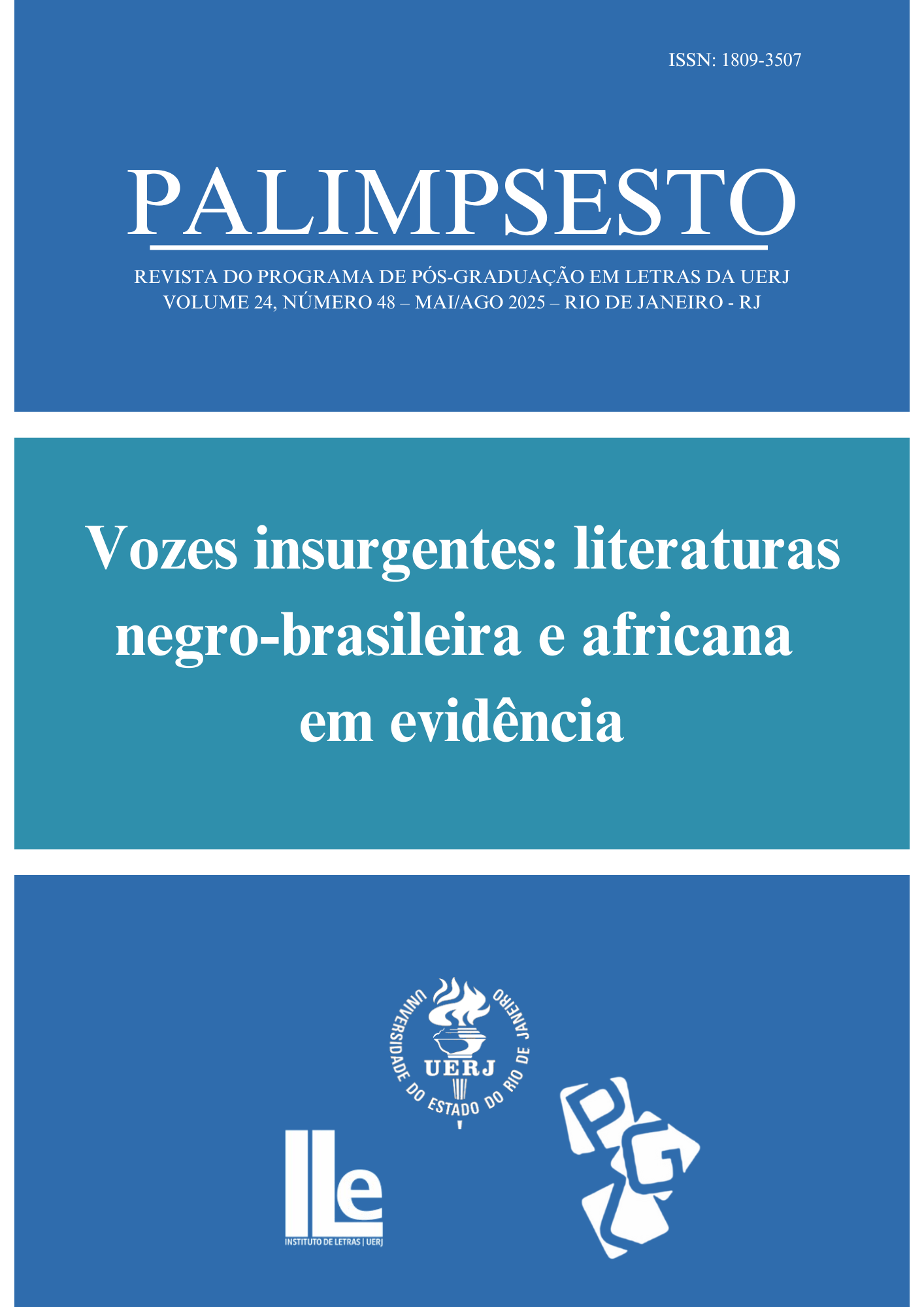Tradução do artigo "O Problema do 'poder': implicações metacríticas da aetonormatividade para a pesquisa em literatura infantil e juvenil"
Metacritical Implications of Aetonormativity for Children’s Literature Research
DOI:
https://doi.org/10.12957/palimpsesto.2025.87947Palavras-chave:
aetonormatividade, metacrítica, poder, autoridade, literatura infantil e juvenilResumo
Este artigo toma como ponto de partida o conceito de aetonormatividade (a normatividade adulta pertinente ao discurso da literatura infantil e juvenil), cunhado por Maria Nikolajeva (2010), na tentativa de unificar as teorias da crítica da literatura infantil e juvenil, cada vez mais orientadas para o poder nas últimas décadas. Reconhecendo a utilidade deste conceito, mas cautelosa com o fato de que ele poderia implicar uma transferência fácil da teoria do poder “adulto” para o estudo da literatura infantil e juvenil, argumento que um sistema de crítica da literatura infantil e juvenil centrado na aetonormatividade precisa crucialmente reconceitualizar a noção de “poder” que está no seu cerne. Qualquer ligação automática entre a normatividade adulta e o “poder” adulto seria, portanto, questionada e criticada. Proponho uma primeira divisão conceitual de “poder” em “autoridade” e “capacidade”, e uma consequente redistribuição desses dois conceitos para as partes adulto e criança/jovem no livro infantil ou juvenil. Em seguida, investigo as implicações críticas e metacríticas de uma sutileza crescente no uso e tratamento do conceito de poder quando nos referirmos ao complexo meio do texto infantil ou juvenil, no quadro teórico de uma crítica da literatura infantil e juvenil centrada na aetonormatividade.
Downloads
Referências
ARENDT, Hannah. Between past and future: six exercises in political thought. London: Faber & Faber,1960.
BOOTH, Wayne Clayson. Why ethical criticism can never be simple. In: DAVIS, Todd; WOMACK, Kenneth. (Orgs.). Mapping the Ethical Turn: a reader in ethics, culture, and literary theory. Charlottesville: University Press of Virginia, 2001, p. 16–29.
HOLLINDALE, Peter. Ideology and the children’s book. Stroud: Thimble Press, 1988.
HUNT, Peter. Criticism, theory, & children’s literature. Oxford: Blackwell, 1991.
HUNT, Peter. Introduction. In: HUNT, Peter. (Org.). Literature for children: Contemporary criticism. London: Routledge,1992, p. 1–17.
HUNT, Peter. Introduction: the expanding world of children’s literature studies. In: HUNT, Peter. (Org.). Understanding children’s literature. London: Routledge, 2005, p. 1–14.
KNOWLES, Murray.; MALMKJÆR, Kirsten. Language and control in children’s literature. London: Routledge, 1996.
LESNIK-OBERSTEIN, Karin. Children’s literature: criticism and the fictional child. Oxford: Clarendon, 1994.
MCGILLIS, Roderick. The Nimble reader: literary theory and children’s literature. New York: Twayne, 1996.
MICKENBERG, Julia; NEL, Philip. (Orgs.) Tales for little rebels: a collection of radical children’s literature. New York: New York University Press, 2008.
NIKOLAJEVA, Maria. Power, voice and subjectivity in literature for young readers. London: Routledge, 2010.
NODELMAN, Perry. The other: orientalism, colonialism, and children’s literature. Children’s Literature Association Quarterly, Vol.17, Nº 1), p. 29–35, 1992.
NODELMAN, Perry. Humane ideology. Children’s Literature, Vol. 22, p. 173–178, 1994.
NODELMAN, Perry. The hidden adult: defining children’s literature. Baltimore: Johns Hopkins University Press, 2008.
PINSENT, Pat. The power of the page. London: David Fulton, 1993.
REYNOLDS, Kimberley. Radical children’s literature: future visions and aesthetic transformations in juvenile fiction. Basingstoke: Macmillan, 2007.
ROSE, Jacqueline. The case of Peter Pan, or the impossibility of children’s fiction. Basingstoke: Macmillan, 1984.
RUDD, David. Theorising and theories: how does children’s literature exist? In: HUNT, Peter. (Org.). Understanding children’s literature. Basingstoke: Routledge, 2005, p. 15–29.
RUDRUM, David. Introduction—Literature and philosophy: the contemporary interface. In: RUDRUM, David. (Org.). Literature and philosophy: a guide to contemporary debates. Basingstoke: Macmillan, 2006, p. 1–8.
SARLAND, Charles. Critical tradition and ideological positioning. In: HUNT, Peter. (Org.). Understanding children’s literature. Basingstoke: Routledge, 2005, p. 30–49.
SHAVIT, Zohar. Poetics of children’s literature. Athens and London: University of Georgia Press, 1986.
STEPHENS, John. (1992) Language and ideology in children’s fiction. London: Pearson, 1992.
SUTHERLAND, Robert David. Hidden persuaders: political ideologies in literature for children. Children’s Literature in Education, Vol. 16, Nº, p. 143–157, 1985.
TATAR, Maria. Enchanted hunters: the power of stories in childhood. New York: WW Norton, 2009.
TRITES, Roberta Seelinger. Disturbing the universe: power and repression in adolescent literature. Iowa City: University of Iowa Press, 2000.
VALLONE, Lynne. Ideas of difference in children’s literature. In: GRENBY, Matthew Orville; IMMEL, Andrea. (Orgs.). The Cambridge companion to children’s literature. Cambridge: Cambridge University Press, 2009, p. 174–189.
WEBER, Max. Economy and society: an outline of interpretive sociology. In: ROTH, Guenther; WITTICH, Claus. (Orgs.). Tradução de Eugene Fischoff et al. Vol. 1. New York: Bedminster Press, 1968.
ZIPES, Jack. Sticks and stones: the troublesome success of children’s literature from Slovenly Peter to Harry Potter. Basingstoke: Routledge, 2001.
ZORNADO, Joseph. Inventing the child: culture, ideology, and the story of childhood. New York: Taylor and Francis, 2001.
Downloads
Publicado
Como Citar
Edição
Seção
Licença
A revista Palimpsesto publica artigos e resenhas inéditos, referentes as áreas de Letras e Linguística. Publica volumes mistos e/ou temáticos, com artigos e resenhas em português, inglês, espanhol e francês.
Autores mantêm os direitos autorais e concedem à revista o direito de primeira publicação, com o trabalho simultaneamente licenciado sob a Licença Creative Commons Attribution, que permite o compartilhamento do trabalho com reconhecimento da autoria e publicação inicial nesta revista.

Palimpsesto utiliza uma Licença Creative Commons - Atribuição-NãoComercial 4.0 Internacional.







